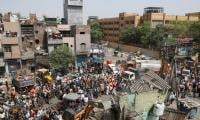planting one tree for every resident of Karachi.
Moreover, we need to find an alternative source of drinking water for the city. Work on the K-IV project has begun but the total demand of water would have increased considerably by the time it is completed.
Waseem Akhtar, Member of Muttahida Qaumi Movement’s Coordination Committee: If the MQM has the privilege of giving Karachi another mayor, we will do our best to mitigate the water crisis plaguing the city by expediting the completion of the K-IV water project.
The shortage of water is a massive problem and if it is not resolved soon, it will be causing riots across Karachi. The K-IV water project is crucial for Karachi. Though the federal government has paid its share, the provincial government hasn’t and this demonstrates how much importance the issue has with them. It is a blunder in the making.
Secondly, we will also streamline the administration and finances of the KMC. We intend to demand for the payment of motor vehicle and land tax to the KMC so it could be invested back into the city and be put to good use.
Thirdly, we will dedicate our attention to improving public transport by ensuring the completion of rapid mass transit projects.
Ali Zaidi, Karachi organiser of Pakistan Tehreek-e-Insaf: Our biggest priority is improving law and order conditions of the city for which an independent police department is necessary, led by the city’s mayor and not by political bigwigs of the provincial government.
We will also focus on improving health and sanitation conditions of the city. More than 20,000 tons of solid waste is produced in Karachi every day and we will take measures to use it for energy production. We have already prepared a policy paper for this, and a few other issues.
Another important area which we will focus our energies to is to improve and streamline the education system in Karachi. We will improve the quality of education being imparted in government schools and ensuring a common baseline standard for private schools.
Engineer Hafiz Naeem-ur-Rehman, Karachi Ameer of Jamaat-e-Islami: The chief issues plaguing Karachi are transport, water distribution, solid waste management, education and affordable treatment at health facilities.
We will resolve the water woes of Karachi in only three years. The K-IV water scheme can be completed during this time and we will ensure that funds for it are released by provincial and federal governments.
For resolving traffic congestion, we will build three buss corridors — from Orangi Town to Tower; from Quaidabad to Tower and from New Karachi to Tower — and build underground connected bridges for the operation of circular railway.
For education, we intend to increase the percentage of budget allocated to 4,500 schools managed by the KMC in Karachi. Right now only two percent of the entire budget is allocated for it and this is not enough.
In the health sector, we plan to revamp government hospitals and set up more facilities dedicated to treating heart patients.
The News: Under the present local bodies system, the elected mayor will not have as many powers as before, since a number of important offices are now being managed by the Sindh government. What’s more, the chief minister now also has discretionary powers to dismiss the elected mayor. What are your reservations and how do you intend to deal with this curtailment of authority?
Najmi Alam: You have seen what happened when during the last local government, the KMC had unfettered powers over the city’s land. Plots were given for peanuts to favoured welfare organizations, and then the land was sold for millions to the people. Housing schemes were built on land reserved for public welfare. Whoever is elected must air his or her grievances within the union committees or their respective district councils. If one is willing to work, then one can work anywhere.
Waseem Akhtar: The local bodies system must be in compliance with the Article 140-A of the constitution which calls for devolution of power to the grass root levels. The Sindh government has all the powers and its hard to even transfer a sanitary worker without the chief minister’s approval. However, the biggest violation of Article 140-A is that the chief minister will grant the final approval of the budget passed by the district council. However, we will try and get the Sindh Local Government Act 2013 amended by the Sindh Assembly.
Ali Zaidi: Local bodies election haven’t been held in Karachi since 2005 and all the power still remains centralised with the provincial government. Our first struggle is to get back the authority for the city’s mayor.
Hafiz Naeem: Under the 18th constitutional amendment, a fair share of power has been devolved to the provinces, but as far as local bodies are concerned the mayor has no control over a number of important offices.
The mayor cannot, under his present authority, run the affairs of Sindh Solid Waste Management Board, Karachi Water and Sewerage Board, Sindh Building Control Authority, Malir Development Authority and Lyari Development Authority, which now function as separate departments.
If our mayor is not empowered, we will fight for it and I hope that the people of Karachi put their trust us. We will exhaust all the constitutional means.







